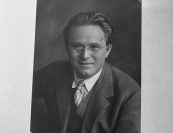Adolf Busch was a man of great musical and personal integrity. The brother of conductor Fritz and cellist Hermann Busch, Adolf was active throughout his life as a prominent chamber music artist, soloist, and composer. Although he was not Jewish, when Hitler came into power in 1933, he moved to Basel, Switzerland and refused to perform in Germany. As the country’s most eminent violinist, he was pressured constantly to return but was reported to reply that “he would return with joy on the day that Hitler, Goebbels, and Göring are publicly hanged.”
In 1939, Busch and his son-in-law Rudolf Serkin left war-torn Europe, eventually settling in the town of Guilford, in southern Vermont, which reminded them of the Swiss countryside. It was there that he would resume his love of playing chamber music with artists of diverse ages, nationalities, and perspectives. Together with Serkin, Hermann Busch, and Marcel, Blanche, and Louis Moyse, they would create Marlboro Music—a community that would be like a large family, with generations of artists sharing their knowledge, experiences, and enthusiasms together, not only in the rehearsal room but in the dining room and at social events.
In Marlboro’s first official summer, in 1951, Busch was heard in performances with the Busch-Serkin Trio; in the Schubert Octet; leading the Marlboro Chamber Players; and playing the Mozart Concerto in G Major, K. 216. There were also reading sessions in the Dining Hall each week. The community that he and his colleagues envisaged had been launched.
Tragically, Busch suffered a fatal heart attack in June of 1952. Rudolf Serkin, who had been taken into Busch’s home and mentored when he was just 18, assumed artistic leadership of Marlboro. He was determined to continue and amplify the musical values and concept of community that Busch had espoused, and to maintain Marlboro as a tribute to his late, beloved father-in-law.
Rudolf Serkin’s tribute to Adolf Busch has become a musical community and influence like no other, one that The New Yorker’s Alex Ross described as “the classical world’s most coveted retreat,” where exceptional young instrumentalists gain insights that change their lives. Generations of musicians and other members of the community, whose lives have been forever enriched by Marlboro Music, will always celebrate and cherish the vision, artistry, and life of Adolf Busch.
A GRANDSON REMEMBERS
John Serkin
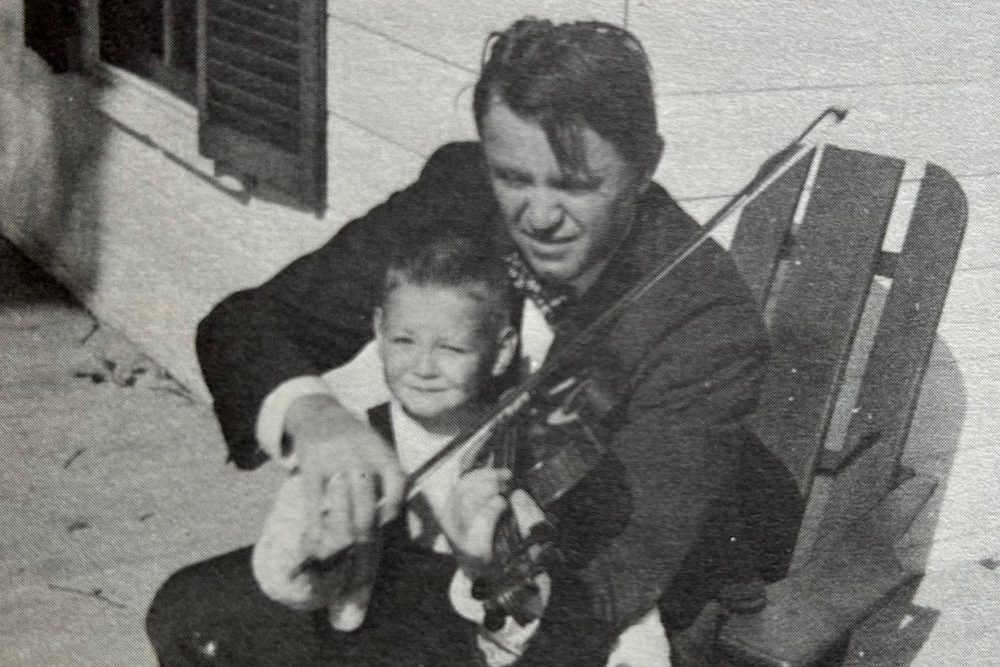
Adolf Busch with his grandson John Serkin in Vermont, 1945.
BUSCH’S INFLUENCE – A MUSICIAN’S PERSPECTIVE
Stephanie Zyzak
Looking back, one sometimes finds specific instances in their life where luck and fate seem to coincide. Adolf Busch entered my life when I was about 5 years old, and though I didn’t know it then, his presence and musical values would have a huge impact on my life to this day.
The recording of Adolf Busch and Rudolf Serkin playing Schubert Fantasy was my first introduction to both these incredible musicians, and it had me obsessed. I remember the Schubert E-flat piano trio with Hermann Busch being on the same recording as well. This was back when we would listen to CDs, and I remember carrying around an old Walkman and listening to this album more times than I could possibly count. I’d soon make my way through the late Beethoven quartets (this being my introduction to the Busch quartet) and through the live Library of Congress recordings with Busch and Serkin. The musical voice of Adolf Busch is instantly distinguishable, always having something deeply profound to say. And yet after listening to these recordings, I’d often be left thinking of how incredible the music was. This, to me, was perhaps the most important aspect of Busch’s musical voice. You see, it was never about Busch—it was always about the music, first and foremost. One only need listen to the Busch quartet’s recording of the slow movement of Beethoven Op. 132 to fully comprehend what it means to live, breathe, and serve music.
Throughout his musical and personal life, Busch has defined what it means to live with both humility and strong moral conviction. This legacy lives on in the spirit of Marlboro and through the many generations of musicians that have turned onto South Road with a summer of incredible music ahead. As a 5 year old listening to his recordings for the very first time, I had no idea that years later I’d be lucky enough to spend time in a place he helped create. And even better, to call it home.
Violinist Stephanie Zyzak first participated at Marlboro in 2019.
Learn more about Adolf Busch’s remarkable life in the interactive timeline below and in Sudip Bose’s article, “The Conscience of Adolf Busch” (The American Scholar, 2017).

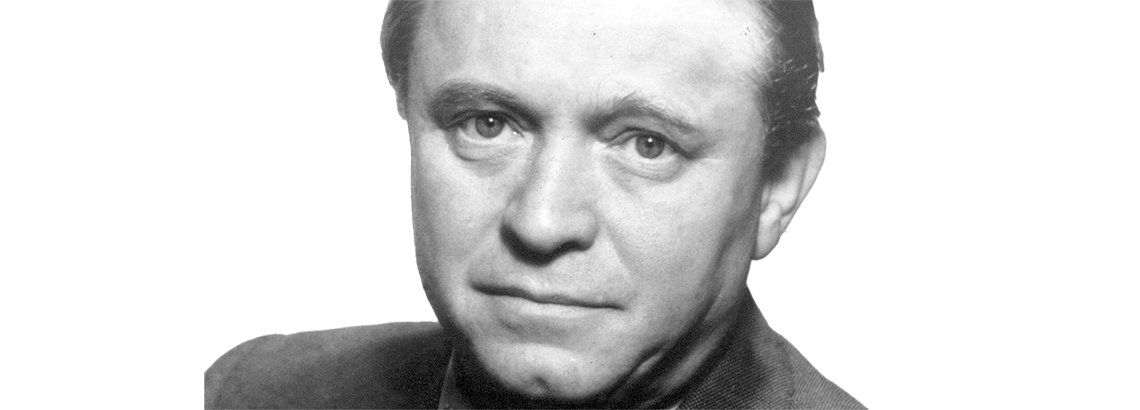
!["[Marlboro was] the greatest success for all concerned, since music was made communally morning to evening—purely for pleasure—in the most varied combinations," said Busch. "He was always eager to talk about music, and ready to play anything just for the fun of it," added Marlboro co-founder Louis Moyse. | Marlboro Music founders Marcel Moyse, Louis Moyse, Rudolf Serkin, Blanche Moyse, Adolf Busch, and Hermann Busch, with Nathan Chaikin (second from left) in 1951.](https://www.marlboromusic.org/wp-content/uploads/2025/05/Marlboro-Music-Founders-173x133.jpg)
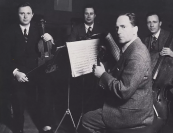
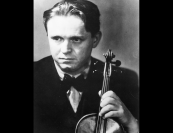
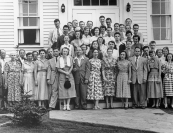
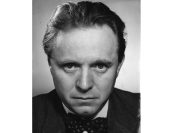
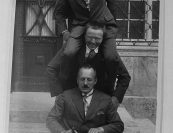
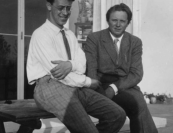
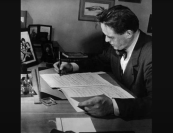
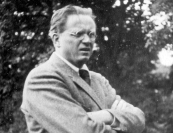
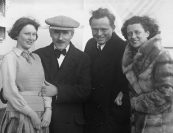
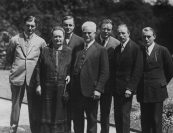

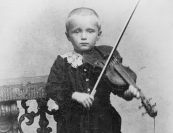
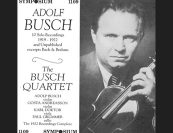
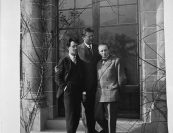
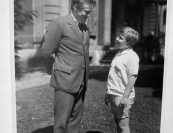
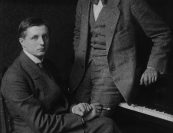
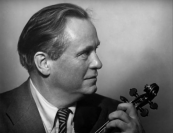
!["I do believe that ensemble playing offers better opportunities for deepening the purely musical approach [than solo playing]," Busch wrote to his brother-in-law Otto Grüters after a Quartet performance. "Playing interestingly is nothing—anyone can do that; but playing rightly [richtig], as we can do, no one else can do that—not even us." | The Busch Quartet in the 1930s.](https://www.marlboromusic.org/wp-content/uploads/2025/05/BSQ-173x133.jpg)
!["Here [in the U.S.], just as much as anywhere else, the public yearns for good music and good art, and is happy about concerts with good programs. So the work that we do here—a few serious artists, Rudi and I, the quartet, my little orchestra, which I have once again established—is very satisfying, for the audiences are on our side." —Adolf Busch, in a letter to his niece, May Fahrländer, in 1942 | Drawing of Adolf Busch and Rudolf Serkin by Hilda Wiener, c. 1935.](https://www.marlboromusic.org/wp-content/uploads/2025/05/rudolf-serkin-and-adolf-busch-by-hilda-wiener-01e24a-173x133.jpg)
![Busch developed into a "remarkable phenomenon" as a composer, Karl Straube, the iconic German organist, once told conductor Siegmund von Hausegger. “It is our duty to support him as a composer—who is completely outside of the party system—because in this capacity he is one of the quiet ones in the country.” Writing about the German premiere of Busch’s Symphony in E Minor, Op. 39 in 1928, critic Werner Wesselhoeft declared, “What first and foremost captivates is the elemental power of expression, not only in terms of dynamics and rhythm, but rather in the naturalness of feeling... With Busch one has [...] the conviction that his work is absolutely honest."](https://www.marlboromusic.org/wp-content/uploads/2025/05/composer-173x133.jpg)

